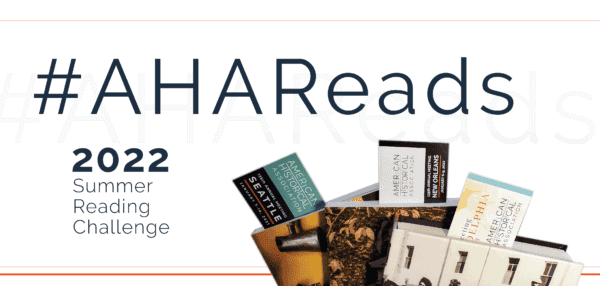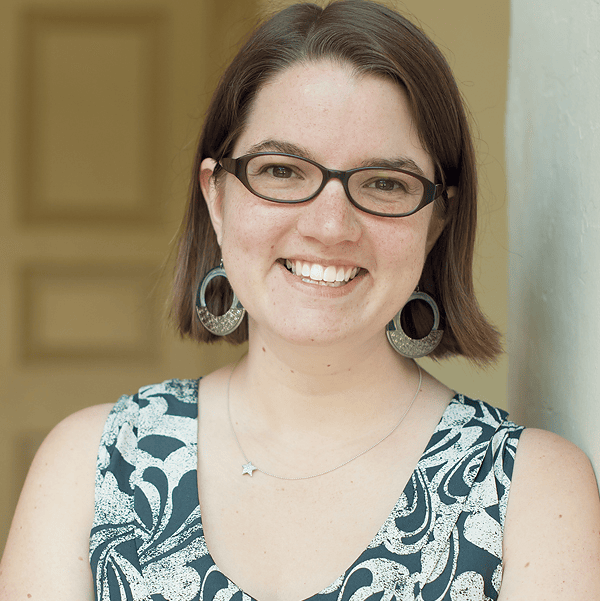As July wraps up, the second month of the AHA Summer Reading Challenge ends with it. We asked AHA members, Council, and staff to share with us what history they had read in July to fulfill tasks in #AHAReads and we’ve compiled some of their responses.

AHA Reads
Read a “classic” of your field that you’ve never read before.
Laura Ansley (AHA managing editor), a historian of girlhood and medicine, is surprised that she had not yet read Joan Jacobs Brumberg’s Fasting Girls: A History of Anorexia Nervosa.
Janice Brockley (Jackson State Univ.) called David Nasaw’s Children of the City: At Work and at Play a great look at a fleeting period in children’s history.
Darcy Fryer (Brearley School) read A Cultural History of the Atlantic World, 1250–1820 by John K. Thornton, which has given her inspiration for her own courses.
Amy Rohmiller (librarian and archivist) checked out a public history classic, Domesticating History: The Political Origins of America’s House Museums by Patricia West.
Pernille Røge (Univ. of Pittsburgh and AHA Council) chose P. P. Sveistrup and Richard Willerslev’s 1945 classic, Den Danske Sukkerhandels og Sukkerproduktions Historie, on the history of the Danish sugar trade and sugar production.
Jonathan Sassi (Coll. of Staten Island and the Graduate Center, CUNY) read Adrian C. Leiby’s The Revolutionary War in the Hackensack Valley: The Jersey Dutch and the Neutral Ground, 1775–1783, which helped him appreciate how much the historiography has changed over the past six decades.
Patrick Sheridan (Univ. of Georgia) turned to The Visible Hand: The Managerial Revolution in American Business by Alfred D. Chandler Jr., first published in 1977.
Read a history published in the past two years.
Rebecca Brenner Graham (Madeira School) read an early copy of Adam Smith’s America: How a Scottish Philosopher Became an Icon of American Capitalism by Glory Liu, which publishes in November.
Alexandra Levy (AHA communications manager) found Soviet Judgment at Nuremberg: A New History of the International Military Tribunal after World War II by Francine Hirsch to be engrossing and insightful. (Hirsch’s visit to the National History Center’s Washington History Seminar is available on YouTube.)
Katharina Matro (Walter Johnson High School and AHA Council) read Tiya Miles’s All That She Carried: The Journey of Ashley’s Sack, a Black Family Keepsake and “was struck by how vividly she describes the life of enslaved women, their pain and their resilience, in spite of a lack of records. So moving and immediate.”
Mary Beth Norton (Cornell Univ.) found that Dennis Duncan’s Index, A History of the:A Bookish Adventure from Medieval Manuscripts to the Digital Age contained “many surprises, including times when scholars produced hostile or snarky indexes of others’ work.”
Jake Purcell (AHA meetings and events associate) chose Legions of Pigs in the Early Medieval West by Jamie Kreiner, which makes use of one of the best-titled AHR articles in recent memory, Marcy Norton’s “The Chicken or the Iegue: Human-Animal Relationships and the Columbian Exchange.”
Serene Bennett Williams (Sacred Heart Schools) recommends other AP Government teachers check out Kristin Kobes Du Mez’s Jesus and John Wayne: How White Evangelicals Corrupted a Faith and Fractured a Nation.
Read a piece of historical fiction (novel, story, poem, play) set in the time or place you study.
Katharina Matro also read When Hitler Stole Pink Rabbit by Judith Kerr with her 11-year-old child, leading them to discuss the devastation of fleeing your home and the difficulties associated with starting from scratch—for people then and now.
Amanda Moniz (National Museum of American History) picked up Amor Towles’s novel The Lincoln Highway.
Kara Swanson (Northeastern Univ.) checked out Rebel Mechanics by Shanna Swendson, a book that asks: What if British magic kept the American Revolution from ever occurring?
Read a history of the place you know the most about that takes place at least a century before or after your time period of expertise.
Laura Ansley also completed this task in July, reading The Boston Massacre: A Family History by Serena Zabin.
Tanya Roth (Mary Institute and Saint Louis Country Day School) chose Heather Cox Richardson’s Death of Reconstruction: Race, Labor, and Politics in the Post-Civil War North, 1865–1901.
Read a history written by a historian who works in a day job different from your own.
Shannon Bontrager (Georgia Highlands Coll., Cartersville, and AHA Council) read Forgotten Veterans, Invisible Memorials: How American Women Commemorated the Great War, 1917–1945 by Allison S. Finkelstein, a historian for the US Army.
Selena Moon read The Irish Diaspora: Tales of Emigration, Exile, and Imperialism by Turtle Bunbury.
Read a history of an identity group you don’t belong to.
Joseph Adelman (Framingham State Univ.) called Hugh Ryan’s The Women’s House of Detention: A Queer History of a Forgotten Prison a fantastic read.
Jehnie Burns (Point Park Univ.) expects Before Trans: Three Gender Stories from Nineteenth-Century France by Rachel Mesch will add a lot to her LGBTQ+ class this fall.
Elizabeth Lehfeldt (Cleveland State Univ.) fulfilled this task with Laboring Women: Reproduction and Gender in New World Slavery by Jennifer L. Morgan.
Michael Novak (George Washington Univ.) read Camilla Townsend’s Fifth Sun: A New History of the Aztecs, covering the Aztec empire’s founding until roughly 100 years after Spanish conquest.
It’s not too late to join the challenge! Simply select three or more tasks to complete before Labor Day. We encourage participants to post about what they’re reading on the AHA Member Forum or on social media using the hashtag #AHAReads. You might see your books show up in a future post on Perspectives Daily.
This work is licensed under a Creative Commons Attribution-NonCommercial-NoDerivatives 4.0 International License. Attribution must provide author name, article title, Perspectives on History, date of publication, and a link to this page. This license applies only to the article, not to text or images used here by permission.



